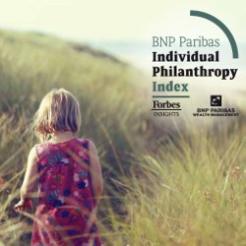The proportion of their wealth that philanthropists give to good causes has dropped slightly in the last year, as individuals’ giving failed to keep up with their increase in wealth, according to the second BNP Paribas Philanthropy Index.
The Index surveys 414 philanthropists across the world on their giving habits and attitudes. It assigns four geographical regions, (United States, Europe, Middle East and Asia) an index score for giving, promotion and innovation, to reach an overall score that indicates how close each region is to reaching its full philanthropic potential.
All giving scores fell across three regions compared with the last survey, with Europe slipping by almost a point from 17.1 to 16.3, Asia by almost two points from 16.2 to 14.3 and the Middle East by 2.5 points from 9.9 to 7.4. The US was not included in the first survey. For a top giving score respondents needed to have donated at least 25 per cent of their annual income and plan to leave 50 per cent to charitable causes in their will.
Kasia Moreno, editorial director at Forbes Insights, who carried out the research said: “The percentage which philanthropists are giving is lower but the actual absolute amount is higher.” She suggested that, “this is because giving has not caught up with the increase in wealth” as the economic situation improves.
Nathalie Sauvant, head of BNP Paribas Wealth Management, added that she had noticed clients being “more cautious” about the amount they initially invest “compared to three or four years ago”.
US-based philanthropists, included for the first time in the survey, scored higher across all four areas than other reigions with a total score of 53.2 per cent. Europe scored 46.3, Asia 42.4 and the Middle East 29.2. The report explains that the Middle East’s lower score reflects a cultural reluctance to ‘promote’ philanthropy because of a religious expectation that they will be philanthropic.
Areas of concern
The top worldwide area in urgent need of support for Europeans, Asians and Middle Easterns was the environment. In America it was health, with the environment not even making it into their top three.
On a regional level, Europe, Asia and the US said health was the area of most urgent concern. In the Middle East the most urgent regional cause most in need was education.









